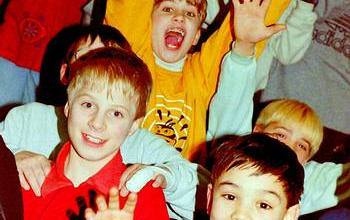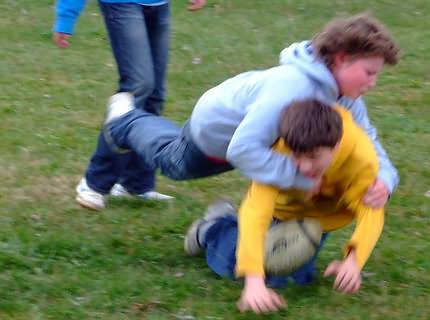source: www.youthwork-practice.com | 2000 Games, Devotions, Themes, Ideas and more for Youth Work
only for private using
Hyperactivity in children & adolescents

hyperactivity? | ©: www.youthwork-practice.com
Is your child exactly what we used to call a "fidgeter"? A troubled child who can never sit still and always has difficulties focusing on one thing only?
Then it could be possible that your child is hyperactive.
What at first may come as a shock to many parents is one of the most common mental disorders in children and adolescents of the present time. You are definitely not alone with your problem. However, relax. These days hyperactivity can be relatively easily controlled, even without drugs and their many side effects.
What is hyperactivity?
The term hyperactivity consists of the syllables “hyper” – meaning “over, too much” and “activity” – meaning – “taking action”. Therefore, the term describes excessive action. This does not only describe physical action but movements, language, gestures and emotions alike. A person who suffers from hyperactivity, is, therefore, "overly active", i. e. he has constant motor movements (wobbling with arms, legs, feet, etc.), is constantly talking or permanently overreacts emotionally, including temper tantrums. However, there are also depressive states - often in quick succession with one another.

hyperactivity kids
©: S.Kobold - Fotolia
Causes of Hyperactivity
Previously it was thought that hyperactive children are a result of poor upbringing. Today is scientifically proven that there are many different reasons of hyperactivity. However, in most studies upbringing is not one of them. For example, researchers found that in children and young people suffering from hyperactivity the regions of the brain controlling the region for attention are measurably smaller than in children who are not diagnosed with hyperactivity. Also scientifically proven hyperactivity has a heredity component. If one parent suffers from hyperactivity, there is an increased risk for their children also to suffer the same disorder.
The direct cause is an error, a faulty signal transmission between the nerve cells and the right anterior frontal lobe. Subsequently the docking points of the nerve cells do not receive the neurotransmitter dopamine and, therefore, they are not able to pass on the necessary signal.
How you recognize hyperactivity in your child
Every child has phases where it is nervous, restless and hard to curb. However, if this phase goes on over an extended period of time, symptoms are getting stronger, this could be an indication that your child is hyperactive. It is important that you observe the behaviour of your child very carefully.
Experts divide the symptoms of hyperactivity into three categories. These are:
Overactivity
The classic forms of overactivity are nervous movements with the limbs (paddles with hands and feet, rocking or sliding on chairs, etc.) plus a constant impulse to action in all areas. (Emotions, language, etc.). Those movements are often uncoordinated and might result in injuries.
Impulsiveness
Children and adolescents who suffer from hyperactivity are dominated by spontaneous urges and follow them without thinking. They have difficulties in integrating themselves into a group setting and are often seen as selfish. For those children, it is particularly hard to deal with frustration. If they are criticized, they respond quick- or ill-tempered and impetuous.
Inattentiveness
Again and again hyperactive children become evident through their inattentive actions. They are hardly able and sometimes even not at all, to concentrate on any given task. They forget details and particular in longer conversations they no longer listen. If given school work they might start multiple tasks at the same time without completing any of them most of the time. It takes just the smallest distraction to dissuade the child from its task.

hyperactivity difficult childrens
©: S.Kobold - Fotolia
How to respond adequately to your hyperactive child
Parents take on a particularly important role for their hyperactive children. Through prudent actions, they can support their child in coping better with himself and his environment. For example, you set up and maintain clear rules. Nothing distresses a hyperactive child as much as inconsistency.
Create detailed daily- and weekly timetables which contain all the necessary tasks such as homework, sports, small household chores or meal times. For compliance with the plan, the child should always get small rewards. This motivates and at the same time softens the impact of seemingly omnipresent rules. If the rules are not observed, it is recommended that parents give the child additional tasks. However, try to avoid the word punishment. This extra job should take the child at least 10 minutes and make sure that you child is able to fulfil that task without too much effort.
Professional help with hyperactivity
Unfortunately, it is not always possible to help you child or teen successfully just by simple means and a change of rules. As a parent, if you feel stuck and feel you can’t get any further, you should seek professional help.
Problem hyperactivity in youth groups
Although hyperactive children are generally very sociable and creative, they often have problems integrating into a group. Due to their "hyperactivity" they develop into outsiders. Unfortunately, that might entail further problems and they are not easily accepted in a group setting.

Rugby: one can really exert oneself | ©: www.youthwork-practice.com
In my opinion, talking to the youth group is not very helpful. What else is there discuss anyway? That the person is hyperactive? ADHD? That he is ill and his behaviour, therefore, is not his fault? Whether hyperactive, fidgety - or shy, quiet and reserved, timid and closed up: every person has his individual quirks. I have this and you have that quirk. It’s part of our personal make-up.
Appealing to the tolerance of each individual in the group might give you the desired success. Ideally you should come up with suitable games. Preferably, such games where an active and inactive part is required.
Working with hyperactive children within the youth group or at camps takes nerves and patience. Don’t be too hard on yourself when entire programs go off the rails. Nevertheless, I would try to integrate those fidgety kids and inspire and challenge them in a way so that their urge for activity is adequately challenged. Trusting him with one or the other small task may work wonders as well.

hyperactivity relaxation exercise
©: Jérôme SALORT - Fotolia
Selfishness, ruthlessness, temper tantrums, not being able to lose a game, impulsiveness, frustration, intolerance, drawing attention at any cost – these are all challenges, every child, every young person needs to learn. Subsequently they have to master those tasks to fit into their social environment, their community. No easy task.
No doubt, for hyperactive children this is much harder than for “regular” children. However, they deserve the same opportunities as everybody else.
[ © www.youthwork-practice.com | 2000 Games and Ideas for Youth Work ]






